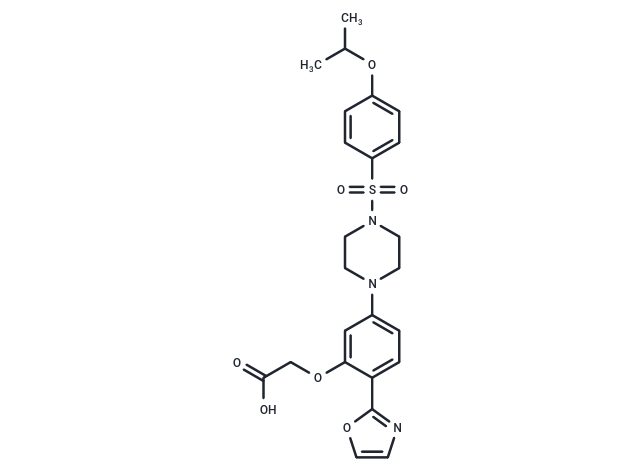Shopping Cart
- Remove All
 Your shopping cart is currently empty
Your shopping cart is currently empty

Asapiprant (S-555739) is a potent and selective DP1 receptor antagonist (Ki: 0.44 nM). It exhibited high affinity and selectivity for the DP1 receptor.

| Pack Size | Price | Availability | Quantity |
|---|---|---|---|
| 1 mg | $34 | In Stock | |
| 5 mg | $98 | In Stock | |
| 10 mg | $158 | In Stock | |
| 25 mg | $298 | In Stock | |
| 50 mg | $472 | In Stock | |
| 100 mg | $768 | In Stock | |
| 200 mg | $987 | In Stock | |
| 1 mL x 10 mM (in DMSO) | $107 | In Stock |
| Description | Asapiprant (S-555739) is a potent and selective DP1 receptor antagonist (Ki: 0.44 nM). It exhibited high affinity and selectivity for the DP1 receptor. |
| Targets&IC50 | DP1 receptor:0.44 nM (Ki) |
| In vitro | Asapiprant strongly inhibited the cAMP elevation elicited by PGD2 in human platelets with a half-maximal inhibitory concentration (IC50) value of 16 nM. Strong inhibition by asapiprant was observed in the cAMP elevation induced by PGD2 in guinea pigs, rats, and sheep with IC50 values (nM) of 61, 74, and 15, respectively. |
| In vivo | Intranasal challenge with 0.5% PGD2 led to a rapid increase in nasal resistance (sRaw) from 5 min to 60 min in sensitized guinea pigs. Oral administration of asapiprant at 1 and 3 mg/kg significantly suppressed the increase in nasal resistance by 82% and 92%, respectively. By contrast, S-5751 showed partial suppression on PGD2-induced nasal resistance in guinea pigs at 30 mg/kg by 76% that was inferior to the suppression by asapiprant at 3 mg/kg. |
| Cell Research | The functional antagonist activity of asapiprant on the DP1 receptor was evaluated by examining PGD2-induced elevation of cyclic adenosine monophosphate (cAMP) in platelet-rich plasma derived from venous blood (humans, guinea pigs, and sheep), and in rat DP1-transfected cells stimulated with PGD2, as described elsewhere. The functional antagonist activity of asapiprant on the DP2 receptor was evaluated by examining PGD2-induced shape change of peripheral eosinophils derived from humans and guinea pigs, as reported previously. |
| Animal Research | After the oral administration of asapiprant or S-5751 to rats, guinea pigs, dogs, and sheep at 10 mg/kg in suspension with 0.5% methylcellulose solution, the plasma concentrations of the drugs were measured by liquid chromatography/tandem mass spectrometry or high-performance liquid chromatography. |
| Molecular Weight | 501.55 |
| Formula | C24H27N3O7S |
| Cas No. | 932372-01-5 |
| Smiles | CC(C)Oc1ccc(cc1)S(=O)(=O)N1CCN(CC1)c1ccc(-c2ncco2)c(OCC(O)=O)c1 |
| Relative Density. | 1.341 g/cm3 (Predicted) |
| Storage | Powder: -20°C for 3 years | In solvent: -80°C for 1 year | Shipping with blue ice. | ||||||||||||||||||||
| Solubility Information | DMSO: 10 mg/mL (19.94 mM), Sonication is recommended. | ||||||||||||||||||||
Solution Preparation Table | |||||||||||||||||||||
DMSO
| |||||||||||||||||||||

Copyright © 2015-2025 TargetMol Chemicals Inc. All Rights Reserved.